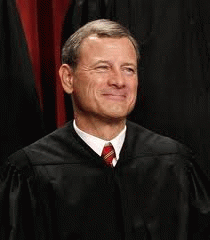Today a majority of the Court upheld the constitutionality of the Affordable Care Act, otherwise known as Obamacare in recognition of its importance as a key initiative of the Obama administration. The big surprise, for many, was the vote by the Chief Justice of the Court, John Roberts, to join with the Court's four liberals.
Roberts' decision is not without precedent. Seventy-five years ago, another Justice Roberts -- no relation to the current Chief Justice -- made a similar switch. Justice Owen Roberts had voted with the Court's conservative majority in a host of 5-4 decisions invalidating New Deal legislation, but in March of 1937 he suddenly switched sides and began joining with the Court's four liberals. In popular lore, Roberts' switch saved the Court -- not only from Franklin D. Roosevelt's threat to pack it with justices more amenable to the New Deal but, more importantly, from the public's increasing perception of the Court as a partisan, political branch of government.
Chief Justice John Roberts isn't related to his namesake but the current Roberts' move today marks a close parallel. By joining with the Court's four liberals who have been in the minority in many important cases -- including the 2010 decision, Citizen's United vs. Federal Election Commission, which struck down constraints on corporate political spending as being in violation of the Constitution's First Amendment guaranteeing freedom of speech -- the current Justice Roberts may have, like his earlier namesake, saved the Court from a growing reputation for political partisanship.
As Alexander Hamilton pointed out when the Constitution was being written, the Supreme Court is the "least dangerous branch" of government because it has neither the purse (it can't enforce its rulings by threatening to withhold public money) nor the sword (it has no police or military to back up its decisions). It has only the trust and confidence of average citizens. If it is viewed as politically partisan, that trust is in jeopardy. As Chief Justice, Roberts has a particular responsibility to maintain and enhance that trust.
Nothing else explains John Roberts' switch -- certainly not the convoluted constitutional logic he used to arrive at his decision. On the most critical issue in the case -- whether the so-called "individual mandate" requiring almost all Americans to purchase health insurance was a constitutionally-permissible extension of federal power under the Commerce Clause of the Constitution -- Roberts agreed with his conservative brethren that it was not.
Roberts nonetheless upheld the law because, he reasoned, the penalty to be collected by the government for non-compliance with the law is the equivalent of a tax -- and the federal government has the power to tax. By this bizarre logic, the federal government can pass all sorts of unconstitutional laws -- requiring people to sell themselves into slavery, for example -- as long as the penalty for failing to do so is considered to be a tax.
Regardless of the fragility of Roberts' logic, the Court's majority has given a huge victory to the Obama administration and, arguably, the American people. The Affordable Care Act is still flawed -- it doesn't do nearly enough to control increases in healthcare costs that already constitute 18 percent of America's Gross Domestic Product, and will soar even further as the baby boomers age -- but it is a milestone. And like many other pieces of important legislation before it -- Social Security, Medicare, Civil Rights and Voting Rights -- it will be improved upon. Every Democratic president since Franklin D. Roosevelt has sought universal health care, to no avail.
But over the next four months the Act will be a political football. Mitt Romney, the Republican presidential candidate, has vowed to repeal the law as soon as he is elected (an odd promise in that no president can change or repeal a law without a majority of the House of Representatives and 60 Senators). Romney reiterated that vow this morning, after the Supreme Court announced its decision. His campaign, and so-called independent groups that have been collecting tens of millions of dollars from Romney supporters (and Obama haters), have already launched advertising campaigns condemning the Act.
Unfortunately for President Obama -- and for Chief Justice Roberts, to the extent his aim in joining with the Court's four liberals was to reduce the public appearance of the Court's political partisanship -- the four conservatives on the Court, all appointed by Republican presidents, were fiercely united in their view that the entire Act is unconstitutional. Their view will surely become part of the Romney campaign.






